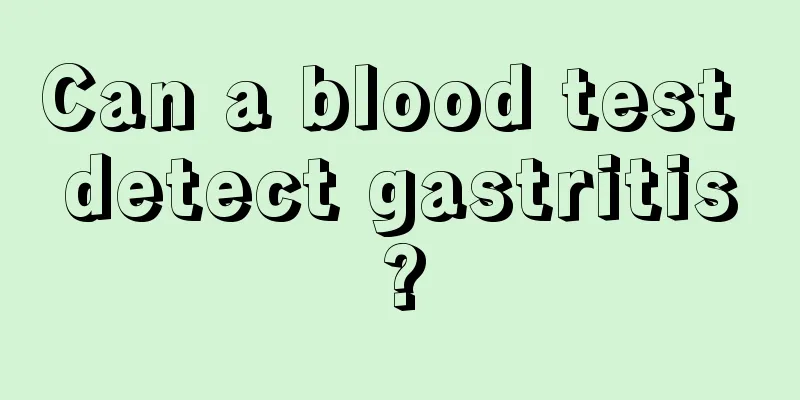Can a blood test detect gastritis?

|
Blood test is a relatively common examination method. For patients with gastritis, gastritis cannot be checked through blood test. In order to check gastritis, a gastroscopy examination is required. In addition, routine stool examination and fecal occult blood test are required. There are many symptoms of acute gastritis, such as stomach pain, bloating, acid reflux and other symptoms. Let us learn about this aspect. Can a blood test detect gastritis? Blood tests cannot detect stomach problems. If it is a stomach problem, you can have a gastroscopy, which can directly show where the problem is. In addition, you can describe the symptoms in detail and develop a reasonable treatment plan. Acute gastritis examination 1. Urgently check blood, urine, stool routine tests, and stool occult blood (if there is vomiting blood, the blood type should be checked and a gastroscopy should be performed within 48 hours). 2. Chest X-ray, B-ultrasound, liver function, electrolytes, blood sugar, blood lipids, ECG. Complete within 3 days. 3. Gastroscopy review before discharge. Symptoms of acute gastritis Common causes include improper diet, alcoholism, and taking stimulant drugs. This is followed by upper abdominal pain, loss of appetite, belching, nausea, and vomiting. People who become ill due to food poisoning are often accompanied by acute enteritis, umbilical pain, diarrhea, fever, dehydration, and even shock. It may also be accompanied by upper gastrointestinal bleeding. Therefore, the patient should be asked about the location, nature, characteristics of the pain, accompanying symptoms, and any triggers. Experience has revealed tenderness in the upper abdomen and around the umbilicus, hyperactive bowel sounds, and occasional fever. Pay attention to signs of dehydration or even shock. Perform routine blood tests and emergency gastroscopy as appropriate. Most cases have acute onset. Symptoms vary in severity. The main symptoms are upper abdominal distension, dull pain, loss of appetite, belching, nausea, vomiting, and in severe cases, the vomitus is slightly bloody. People who are sick because of Salmonella or Staphylococcus aureus and their toxins usually develop the disease within a few hours or 24 hours after eating, and are often accompanied by diarrhea and fever. In severe cases, there is dehydration, acidosis or shock. Laboratory examination showed an increase in peripheral blood white blood cell count and neutrophilia. X-ray examination showed that the lesion mucosa was rough, locally tender, and irritable. Endoscopic examination showed congestion, edema, exudation, spotty hemorrhage or erosion of the gastric mucosa. Causes 1. Physical and chemical factors: Overly cold or overheated food and drinks, strong tea, coffee, spirits, irritating condiments, overly rough food, and drugs (especially non-steroidal anti-inflammatory drugs such as aspirin and indomethacin) can all irritate the gastric mucosa and damage the mucosal barrier. Drugs such as aspirin can also interfere with the synthesis of sulfoglycoprotein by gastric mucosal epithelial cells, reduce gastric mucus, weaken the protective effect of lipoprotein membrane, cause reverse diffusion of hydrogen ions in the gastric cavity, lead to the release of histamine by mast cells in the mucosal lamina propria, increase vascular permeability, and cause pathological processes such as gastric mucosal congestion, edema, erosion and bleeding. The synthesis of prostaglandins is inhibited, and the repair of gastric mucosa is also affected. 2. Biological factors: bacteria and their toxins. Common pathogens include Salmonella, halophilic bacteria, pathogenic Escherichia coli, etc. Common toxins include Staphylococcus aureus or Clostridium difficile toxins, especially the former. Gastritis or concurrent enteritis may occur a few hours after eating food contaminated with bacteria or toxins. This is acute gastroenteritis. Acute gastroenteritis is the ingestion of staphylococci and their toxins combined with enteritis. Disease onset is more rapid after ingestion of staphylococci and their toxins. In recent years, there are also a few cases of this disease caused by viral infection. 3. Other foreign bodies or gastric stones in the stomach, and radiotherapy in the gastric area can all serve as exogenous stimuli and lead to this disease. Emotional fluctuations, stress states and allergic reactions caused by various factors in the body can act as endogenous stimuli and cause disease. |
<<: Can honey remove dark circles?
>>: Can honey remove wrinkles?
Recommend
What are the symptoms of allergic rhinitis and conjunctivitis
The nose and eyes are generally the parts that pe...
How to determine whether it is cervical cancer
Cervical cancer is a malignant tumor originating ...
What are the dietary taboos in the early stages of rectal cancer
In order to sell food that is about to go bad, ma...
What are the dangers of hereditary skin cancer
Skin cancer is a malignant tumor that really make...
What are the symptoms of Pseudomonas aeruginosa infection
Pseudomonas aeruginosa is a common bacterium in n...
Is it good to have hard hair
Each person's hair quality and strength are d...
Which type of lung cancer does differentially differentiated carcinoma belong to?
Poorly differentiated cancer refers to a specific...
How many times can you sweat during the full moon
After giving birth, women are very weak, and most...
Does thyroid cancer cause difficulty in swallowing?
Thyroid cancer is a common endocrine tumor in cli...
Can a blood test detect nasopharyngeal cancer?
Nasopharyngeal cancer cannot be diagnosed by simp...
Where is the best place to treat ovarian tumors
Ovarian tumors are a very common type of female g...
Is it possible to have sex right after the menstrual period?
Every woman knows that you cannot have sex during...
Malnutrition of A
When the human body has some problems, not only d...
How to detect lung cancer at an early stage
How to detect lung cancer early? Usually, it need...
Five early symptoms of gastric cancer
The five early symptoms of gastric cancer include...









